Tuesday Feb 17, 2026
Tuesday Feb 17, 2026
Friday, 17 June 2022 00:15 - - {{hitsCtrl.values.hits}}
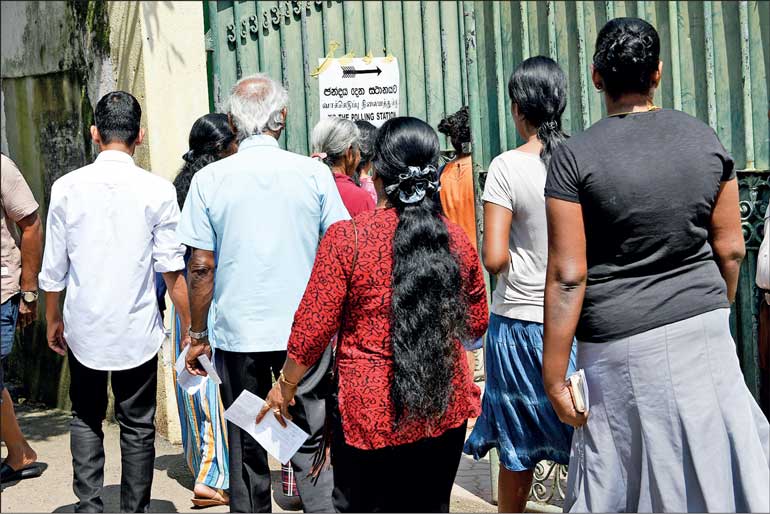
Elections during an economic turmoil is not the answer – Pic by Shehan Gunasekara
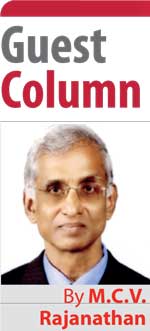 The dramatic events in the political scene of the country and the emergence of a new Prime Minister with a new government has resulted in attention being now shifted towards the 21st Amendment to the Constitution and the need for complete system change which is the need of the hour. According to media reports the necessity of amending the existing electoral system is once again being discussed at various levels of political and intellectual forums. It should be noted the previous Government appointed a Parliamentary Select Committee to revise the electoral process.
The dramatic events in the political scene of the country and the emergence of a new Prime Minister with a new government has resulted in attention being now shifted towards the 21st Amendment to the Constitution and the need for complete system change which is the need of the hour. According to media reports the necessity of amending the existing electoral system is once again being discussed at various levels of political and intellectual forums. It should be noted the previous Government appointed a Parliamentary Select Committee to revise the electoral process.
Elections and amendment of the electoral system
The need of the hour at this stage is not elections which the country cannot afford and should be avoided. Even the Election Commission has expressed concern while stating elections should be avoided as they are not ready to face such an eventuality at the present moment apart from the massive cost the country will have to expend at a time of financial crisis. At a time when the citizens of the country at every level are suffering for their basic amenities, elections during an economic turmoil is not the answer and the existing environment is not conducive for the candidates to interact with their voters.
The reality is, holding a Parliamentary election at present is constitutionally not feasible unless the Parliament votes for a premature dissolution by a majority of votes. Such an eventuality is wishful thinking as no member will opt to go for an election under the current circumstances as most of them will be concerned in retaining their seats considering the cry for a complete system change. The earliest date we could expect a dissolution will be in February, 2023 when the President will have the power constitutionally to dissolve after the current Parliament completes a period of two and a half years.
It should be emphasised the existing political crisis is causing severe damage to our ailing economy and tourism on which the country is dependable, is the biggest casualty apart from various other sectors, hence if the need of the hour is elections towards resolving the current deadlock and if elections are the best option, then this option needs to be explored as it will offset the current loss to the country’s economy and the existing political instability towards establishing political stability which is an essential component for economic stability. However, any premature dissolution of the Parliament towards conducting an early election now, are in the hands of our Parliamentarians as explained above.
Prior to exploring the feasibility of conducting any polls the agony and suffering of the people, mainly towards providing the basic necessities without any hindrance should be considered and resolved for them to exercise their franchise in a peaceful environment.
Taking into consideration the current cry for system change, the authorities should make use of this opportunity to do away with the PR system covering our electoral process which in my opinion is the main route cause of the current problem faced by the country. The existing PR system shut the door for Professionals and learned people’s entry to the Parliament. Going for elections under the existing PR system will result in having the same old set of people being re-elected, hence elections under the old electoral system of First Past the Post system, in my opinion is the best solution.
At this opportune moment I am once again prompted to share my thoughts in highlighting some of the flaws in our existing electoral system and venture into some of the historical facts for the benefit of the concerned citizens.
I should however confess, I do not claim to be a Constitutional expert, nevertheless, as a keen follower of the political developments in our country, I take the liberty of sharing my thoughts for the greater benefit of the people. I cherish the numerous opportunities I had in the past, in visiting our Parliament and most importantly in listening to many interesting Parliamentary debates notably by many reputed and well-respected intellectual politicians of yesteryears. I have spent long hours in the Public Gallery of Parliament, just to listen to the debates of intellectual politicians of yesteryears many of which still linger in my mind. One has to read the Hansard to ascertain the numerous contributions made by our Parliamentarians of yesteryears. Sadly at present there is a vacuum and such contributions appear to be lacking.
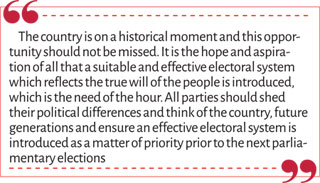 Existing PR system
Existing PR system
It is the view of a vast majority of the people that the existing electoral system is not in line with the effective representation of the people.
Under the existing PR system, the procedure adopted in electing a representative leads candidates from one and the same party firing shots at each other to obtain the preferential votes which ultimately decides the winner. Candidates are compelled to compete not only with their rivals in the opposing parties; they have to compete with rivals within their own party as well in their designated district.
If an individual is desirous to serve the people and enter Parliament, such personalities are compelled to campaign not only in their chosen electorate as the organiser; they have to campaign in the entire district within which their electorate is located.
There were numerous instances in the past of such organisers, who even though they won their electorates couldn’t gain entry to Parliament due to their inability to win the support of the voters of the entire district which is a costly exercise. Many others even though they failed to win their chosen and designated electorate, were able to gain entry to Parliament due to their ability to win the entire district. In certain cases some electorates were fortunate to have more than one member to represent them while a few others have none. This is a serious flaw which needs to be rectified towards an effective system of representation.
The candidates who possess the ability to conduct an effective marketing campaign ultimately gain entry to the Parliament. It ultimately boils down to one’s ability to conduct an effective marketing campaign and such campaigns needless to state are costly which an ordinary citizen cannot afford. The PR system, deprives intellectuals without money power to enter Parliament. It is reported millions are spent by the candidates for their campaigns in the Parliamentary elections.
At our Parliamentary elections it’s a common phenomenon of interparty clashes for preferential votes which is a common and a compelling necessity. This is bound to continue at future elections as well if the elections are conducted under the existing PR system.
It is noteworthy to mention at the recently concluded Australian Federal elections two Sri Lankans who migrated many years ago were able to contest and succeed in entering the Australian Federal Parliament. Their electoral system provides winnable opportunities for all to enter the Federal Parliament.
It is no exaggeration to state based on the interactions we used to have with various people at several social gatherings, and other fora many of the voting population particularly during the electoral process were unaware of the profile of their candidates, apart from a handful who were able to give wide publicity and market their preferential number by displaying posters at each and every public place. Under the existing Proportional Representation System of electing representatives, many leading and popular personalities at times are not successful in getting elected due to their inability to effectively market their preferential number which is a major deciding factor. Candidates well-accepted and respected in their chosen electorates at times fail to enter Parliament even though a majority of their electorates would have voted for them.
It was reported votes representing 4.5% of the total votes polled were rejected at the last Parliamentary elections as spoilt votes. Whether this is deliberate or due to lack of understanding of the electoral process is not clear. The format of the ballot paper which had to accommodate numerous symbols, in addition to the preferential numbers may have confused certain section of the voting population and contributed towards the rejection.
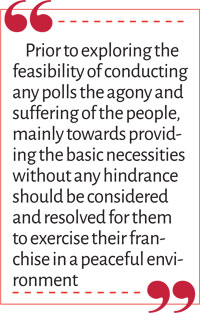 First Past the Post system
First Past the Post system
The reintroduction of the ‘First Past the Post’ (FPP) system, replacing the existing PR system or a mixture of both if desired is the need of the hour and it will bring in hopes to the young people and all other concerned citizens who desire a complete system change. They could emerge as partners in the decision-making process. This could also reflect in direct representation of the people in the legislature.
The First Past the Post system, under which the voters elect their representatives electorate-wise as prevailed decades ago, is the compelling need of the hour. Many of the Asian countries have such representative system of elections. This will ensure the entry of learned and people of high integrity to our legislature. It will also provide people with the representatives they deserve and the voters will have a personal touch with their elected representatives with greater access towards resolving their problems. Such personalities could effectively contribute towards the governance by sharing their valuable knowledge and expertise for the greater benefit of the country.
PR system and independent candidates
The 1978 Constitution was a complete departure from the previous electoral process of electing direct representatives through the electorates. The pervious system allowed candidates from recognised political parties and independent candidates to contest in any electorate of their choice. Prior to 1978 there were many well-known and popular Members of Parliament not aligned to any political party. They were able to contest as independents and win their seats with a vast majority solely due to their popularity among their voters. Many of them immensely contributed towards governance and important Parliamentary debates. Independent voices are currently stilled as the members come under the Party whip.
The existing PR system deprives the entry of any independent candidates unless they form a group and file in their nominations collectively. The success of such independent groups are very remote. As a matter of fact, there were no independent members of Parliament after the introduction of the 1978 Constitution. There is no way an independent candidate could gain entry to Parliament under the existing electoral system unless they are aligned to a registered political party.
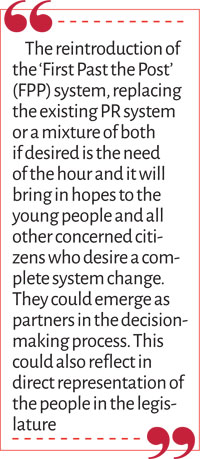 National List
National List
The 1978 Constitution provided for the accommodation of members through the National List, based on the overall percentage of votes obtained island-wide by each party. This provides for the appointment of 29 members, while 196 are elected under the PR system. All parties are entitled to appoint members based on their overall performance. The framers of the constitution envisaged the introduction of the National List mainly to accommodate intellectuals and technocrats, not in a position to contest and win at an election as the country could immensely benefit from their expertise. The original purpose for which this was introduced does not appear to have been fully achieved. The existing limitation of 29 members under the National List needs to be re-examined towards accommodating technocrats with professional expertise who could contribute towards effective governance.
It is noteworthy to recall the Constitution of 1972 introduced by the then United Front Government completely abolished the National List or the “Appointed MPs” as they were called then. All candidates had to enter Parliament through the votes of the people. Prior to the introduction of the 1972 Constitution there was a provision to appoint MPs under the clause of “Appointed MPs” which was restricted to only six members. Some of the appointed members of Parliament including well-known personalities sought re-election and were compelled to contest. All of them lost their seats.
Parliamentary vacancies and by-elections
Prior to the introduction of the PR system in 1978, whenever a vacancy occurred in Parliament, the people had the opportunity of electing a new member of their choice at a by-election. In many countries such vacancies are filled by having by-elections for a vacant seat. The PR system deprived this opportunity to the people in electing the representatives of their choice whenever such vacancy occurs.
The incumbent government is deprived of testing the public opinion at regular intervals whenever an opportunity arises due to the death, resignation or a member forfeiting the seat consequent to an election petition. Prior to 1978, all such vacancies were filled after a by-election. This gave an opportunity to the people to give a message to the Government and the Opposition on several vital issues affecting not only the particular electorate but also the entire country. In the absence of regular Opinion polls in our country such an exercise will be a very valuable tool for all parties to ascertain the acceptability of their direction and policies.
The replacement of this system by PR resulted in a situation where such vacancies are now filled by the candidates defeated at the previous elections, gaining entry to Parliament based on their preferential votes polled at the last elections. Individuals, defeated at the previous elections become Members of Parliament overnight. This deprives the voters an opportunity to elect a new representative of their choice. The proposed electoral reform should give due consideration to the re-introduction of by-elections.
Anti-Defection Law
Serious consideration should be given towards the introduction of the “Anti Defection Law” which will effectively prevent the members from crossing over to other parties. If they cross over they should automatically forfeit their seat and seek re-election. This Law is effective notably in the Indian Constitution which has effectively shut the door for any cross overs. This will also ensure the stability of a government. If such a provision was in existence it would have prevented the passing of the 20th Amendment to the Constitution as the ruling part didn’t have the two-third majority on its own.
Dissolution of Parliament
It is noteworthy to recall the repealed 19th Amendment deprived the President of the power to dissolve Parliament unless it is voted by two-third of the members of Parliament. Such an exercise is unthinkable and unrealistic as no member will give their consent for such a premature dissolution. The framers of this stipulation failed to realise this aspect and its reality. This resulted in the major Constitutional crisis in October, 2018 and the Supreme Court by its unanimous decision ruled the then President didn’t possess the power nor authority to dissolve the Parliament prior to the expiry of the stipulated period of four and a half years. This even deprived the new President in dissolving the Parliament immediately after his victory in November, 2019, which would have saved the calamity of having the elections under the global pandemic. This period has now been reduced to two and half years under the 20th Amendment.
Lessons to be learnt
It is appropriate to recall in India it was reported, at the last Kerala State Assembly elections the incumbent Government led by the left party was returned with an overwhelming majority. The main reason for its victory was attributed to its success in effectively controlling COVID-19. Many commended the government and notably its Health Minister who was a Physics Teacher. She was re-elected by a vast majority. What is heartening to note is the party’s ability and courage to appoint a new cabinet comprising of 31 newly elected members.
None from the previous cabinet were reappointed. Even the Health Minister who was recognised by the UN for her efforts in effectively controlling COVID-19 was excluded. It was a decision of the party to give opportunity and tap and utilise new talent for the greater benefit of the State. This decision was gracefully accepted by all members of the outgoing cabinet. In addition all the members who have served two terms were deprived of re- nomination as the party desired to have new members with new expertise.
Perhaps our leaders could learn a lesson from the Kerala model in tapping new expertise. In our country it is evident many members have been enjoying the ministerial perks for several decades continuously despite whatever government is in power. A party should have the courage to take such hard decisions which may have been deprived due to lack of expertise which could be attributed mainly to the existing PR system of electing representatives. In the absence of any primary election process in selecting candidates, party leaders are vested with a great responsibility in selecting suitable candidates. Party leaders should ascertain the eligibility of their candidates, their track records, etc., before giving nominations without blaming the voters, as the choice of the electors are limited.
Presidential election and nomination of candidates
At this stage there is again talk of the abolition of the Executive Presidency. Many past Presidents, starting from President Chandrika Kumaratunga gave assurances of their willingness to abolish the Executive Presidency. However, once they had the taste of the Executive Presidency they didn’t take any initiative to abolish it.
I recall many years ago at a forum in Colombo, there were many speakers notably the late Gamini Dissanayake and Chandrika Kumaratunga who was at that time the Chief Minister of the Western Province. It is interesting to recall former President J.R. Jayewardene was present as an observer. M. Sivasithambaram, the late veteran leader of the TULF, a lawyer by profession who once held the post of the Deputy Speaker of Parliament, in his address stated, “Executive Presidency is here to stay. Even if you elect a Saint as the Executive President he or she will never take the steps to abolish it.” He told the audience to write it and keep it. His words still resonate in my ears. How his words of prophecy has become a reality. Absolute power corrupts absolutely.
Executive Presidency
According to media reports, an amendment to the Constituent by way of a 21st Amendment which envisages the reduction of certain powers of the Executive are to be transferred to the Parliament. It has also been reported a further amendment will be brought towards the complete abolition of the Executive Presidency. Such an amendment towards abolishing the Executive Presidency, according to legal luminaries may require a referendum. If such a course of action is envisaged it will be feasible for the authorities to consider conducting such an exercise with the anticipated general elections towards minimising the cost. The voters could be given two ballot papers to ascertain their preference.
If the Executive Presidency is to be retained it will be prudent to reconsider the electoral process of the Presidency. It is interesting to note at the last Presidential election, there were 34 candidates from various political parties and colours. Many of the candidates were well-aware, their prospects of victory was remote. Some filed in their nominations as proxies for the major candidates. This cost the country and the Election Commission an additional sum of Rs. 2 billion. It also contributed in confusing the voters in appropriately identifying their preference from the long ballot paper, which was two feet in length as it had to accommodate all 34 candidates.
If the Executive Presidency is to remain serious consideration should be given towards amending the existing eligibility criteria to make it mandatory for a candidate to at least obtain a stipulated reasonable number of votes from the total votes polled. The deposit should be increased substantially or in the alternative they should be stipulated to provide a bank guarantee which is equivalent to cash. This will ensure the entry of only serious candidates and will be a blessing not only for the Election Commission, it will also enable the voters to select their preferred candidate without any difficulty and will minimise the expenditure.
Another important aspect which is to be considered at this stage is whether it will be prudent to spend millions of rupees in electing a President without any executive power. This will arise in the event of the powers of the Executive Presidency is diminished by the impending amendment. In such an eventuality a suitable cost effective mechanism of electing the President should be explored. The selection process of the Indian Presidency is a good mechanism to follow.
Introduction of Electronic Voting Machines (EVM)
At a time when we are facing a foreign exchange crisis with the cost of printing materials the time is now opportune to consider utilising technological innovations towards the conduct of elections and counting of votes. In comparison to the pencil and paper system which is in existence at present in casting the voters’ preferences and the resultant counting of such ballot papers, effective introduction of EVM will ensure the voices of the people are clearly heard. This system is in place in neighbouring India and is reported to be working well. This will minimise any form of manipulation in tampering with the choice of the voters. This option should be explored seriously and as a pilot project could be introduced in certain districts prior to extending it to the entire country. The existing election laws may have to be amended to facilitate this process.
Expenditure on elections
We spend massive amounts on elections and according to media reports a sum of Rs. 10 billion has been expended at the last Parliamentary elections. In addition to the substantial amount expended by each candidate. Elections to the Provincial Councils and Local Government are overdue. The terms of the Provincial Councils have expired while the terms of the Local Governments have been extended. Needless to state conducting these elections will result in the expenditure of substantial sum and resources.
The authorities should seriously consider a mechanism to have at least all three major elections on one and the same day (i.e., the Presidential, Parliamentary and Provincial Councils). Such systems are in existence in many developed countries.
The voters could be given the ballot papers to elect their President, Member of Parliament and the Provincial Councillor/Local Councillor on one and the same day. Not only billions of rupees could be saved, it will ensure political stability in the country and the policymakers could concentrate on their mandate and responsibilities entrusted to them by the people without wasting their precious time and energy on election campaigns.
The country is on a historical moment and this opportunity should not be missed. It is the hope and aspiration of all that a suitable and effective electoral system which reflects the true will of the people is introduced, which is the need of the hour.
All parties should shed their political differences and think of the country, future generations and ensure an effective electoral system is introduced as a matter of priority prior to the next parliamentary elections.